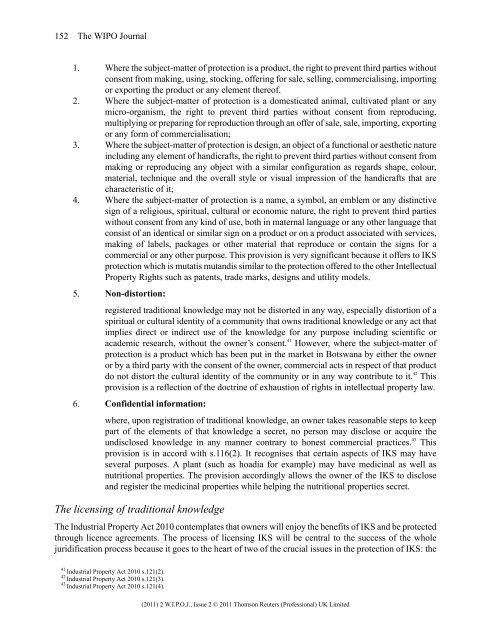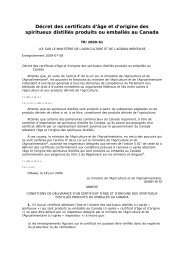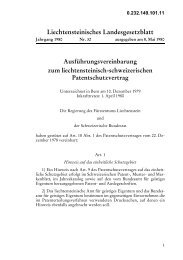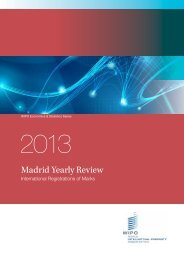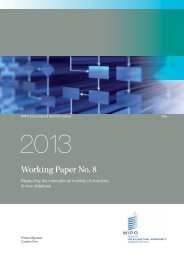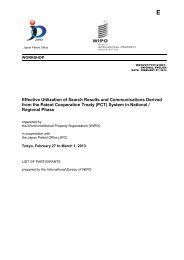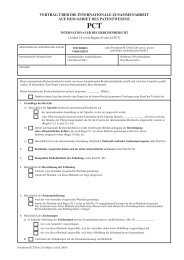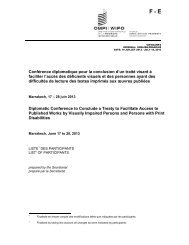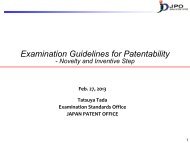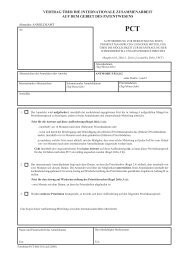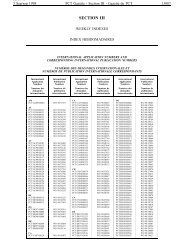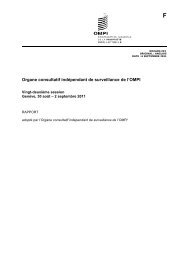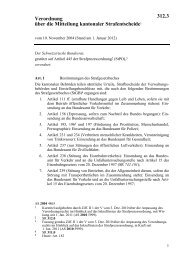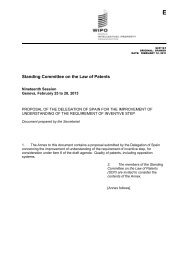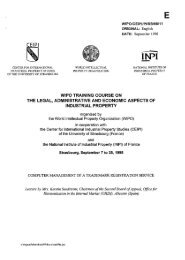WIPO Journal - World Intellectual Property Organization
WIPO Journal - World Intellectual Property Organization
WIPO Journal - World Intellectual Property Organization
You also want an ePaper? Increase the reach of your titles
YUMPU automatically turns print PDFs into web optimized ePapers that Google loves.
152 The <strong>WIPO</strong> <strong>Journal</strong><br />
1. Where the subject-matter of protection is a product, the right to prevent third parties without<br />
consent from making, using, stocking, offering for sale, selling, commercialising, importing<br />
or exporting the product or any element thereof.<br />
2. Where the subject-matter of protection is a domesticated animal, cultivated plant or any<br />
micro-organism, the right to prevent third parties without consent from reproducing,<br />
multiplying or preparing for reproduction through an offer of sale, sale, importing, exporting<br />
or any form of commercialisation;<br />
3. Where the subject-matter of protection is design, an object of a functional or aesthetic nature<br />
including any element of handicrafts, the right to prevent third parties without consent from<br />
making or reproducing any object with a similar configuration as regards shape, colour,<br />
material, technique and the overall style or visual impression of the handicrafts that are<br />
characteristic of it;<br />
4. Where the subject-matter of protection is a name, a symbol, an emblem or any distinctive<br />
sign of a religious, spiritual, cultural or economic nature, the right to prevent third parties<br />
without consent from any kind of use, both in maternal language or any other language that<br />
consist of an identical or similar sign on a product or on a product associated with services,<br />
making of labels, packages or other material that reproduce or contain the signs for a<br />
commercial or any other purpose. This provision is very significant because it offers to IKS<br />
protection which is mutatis mutandis similar to the protection offered to the other <strong>Intellectual</strong><br />
<strong>Property</strong> Rights such as patents, trade marks, designs and utility models.<br />
5. Non-distortion:<br />
registered traditional knowledge may not be distorted in any way, especially distortion of a<br />
spiritual or cultural identity of a community that owns traditional knowledge or any act that<br />
implies direct or indirect use of the knowledge for any purpose including scientific or<br />
academic research, without the owner’s consent. 41 However, where the subject-matter of<br />
protection is a product which has been put in the market in Botswana by either the owner<br />
or by a third party with the consent of the owner, commercial acts in respect of that product<br />
do not distort the cultural identity of the community or in any way contribute to it. 42 This<br />
provision is a reflection of the doctrine of exhaustion of rights in intellectual property law.<br />
6. Confidential information:<br />
where, upon registration of traditional knowledge, an owner takes reasonable steps to keep<br />
part of the elements of that knowledge a secret, no person may disclose or acquire the<br />
undisclosed knowledge in any manner contrary to honest commercial practices. 43 This<br />
provision is in accord with s.116(2). It recognises that certain aspects of IKS may have<br />
several purposes. A plant (such as hoadia for example) may have medicinal as well as<br />
nutritional properties. The provision accordingly allows the owner of the IKS to disclose<br />
and register the medicinal properties while helping the nutritional properties secret.<br />
The licensing of traditional knowledge<br />
The Industrial <strong>Property</strong> Act 2010 contemplates that owners will enjoy the benefits of IKS and be protected<br />
through licence agreements. The process of licensing IKS will be central to the success of the whole<br />
juridification process because it goes to the heart of two of the crucial issues in the protection of IKS: the<br />
41 Industrial <strong>Property</strong> Act 2010 s.121(2).<br />
42 Industrial <strong>Property</strong> Act 2010 s.121(3).<br />
43 Industrial <strong>Property</strong> Act 2010 s.121(4).<br />
(2011) 2 W.I.P.O.J., Issue 2 © 2011 Thomson Reuters (Professional) UK Limited


